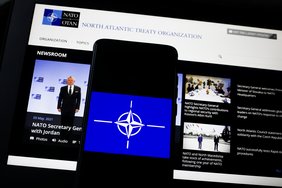Global transformation processes, the crisis of multilateralism as well as the decline of democratic values yield new reflections on the strategic orientations of central security institutions like NATO. The principles of collective security and collective defense represent essential components of the postwar international order. Both are based on joint action, including the use of military means in the event of breaches of the peace or aggression.
Research on NATO from the postwar period to the end of the Cold War has many parallels with contemporary scholarly debates. For example, we find papers on NATO themes in early issues of the American Academy of Political and Social Sciences from 1953 (issue 288) as well as 1964 (issue 351) that are still relevant today. These examine persistent command&control controversies in the nuclear arena in the context of a multilateral NATO, great power China and the Formosa (Taiwan) issue, as well as the potential for conflict against the backdrop of a world with an ever-increasing number of political actors.
Ontological questions about NATO were explored by the US Secretary of State Henry Kissinger in the late 1960s ('NATO: Evolution or Decline,' 1966, The Texas Quartely 9: 3). Against the backdrop of the détente policy toward the Soviet Union and following France's withdrawal from the integrated military structure in 1967, NATO research in the late 1970s and early 1980s was intensely concerned with the future substantive orientation of the organization.
The NATO research during the 1980s was again oriented toward controversial issues such as the management of the nuclear dilemma, the Spanish referendum, or "moral issues" (Abshire 1984), as well as deterrence and crisis management in the context of the impending dissolution of the Soviet Union. Europeanization processes, burden-sharing, complementarity, and 'free-riding' (see the essay by Murdoch and Sandler in the Journal of Public Economics, 1984) were also part of academic debates about NATO. This is despite the fact that in the period from the late 1970s to the mid-1980s, European NATO allies spent on average 3.7 percent of GDP on defense, significantly more in percentage terms than today.
The balance-of-power theory of international relations predicted the end of NATO after the end of the Cold War. In his famous 1996 essay in International Organization, Robert McCalla explained the alliance's endurance through the expansion of its goals – such as the introduction of cooperative security and crisis management as central tasks alongside collective defense – but also through the organization's growth. Other approaches explain NATO's continuity by the emergence of a community based on shared norms that went beyond a purely military alliance.
Many areas of NATO research prior to 1989 remained relevant even after the turn of the millennium. Specifically, NATO research in the new millennium dealt with the missions in the Bosnian War, Kosovo, or Afghanistan, as well as with NATO's role in the defense of Europe. In this context, the focus shifted above all to the overlap between the areas of responsibility of the European Common Security and Defense Policy and NATO. New topics, such as out-of-area missions, questions of identity, or feminist approaches also shaped the post-2000 research landscape on NATO. Intensive research is also being conducted on significant policy decisions in modern history, based on recently declassified documents, in order to gain a better understanding of historical events.
Entangled in a global interregnum in which old certainties suddenly dissolve and new uncertainties determine everyday political life, the task of peace research today is to answer the following questions: How can security institutions such as NATO promote greater political cohesion in the face of growing challenges? Under what conditions is global cooperation possible today? How can conflicts be resolved sustainably and more peace and security be achieved for citizens? These questions will continue to shape the NATO research agenda in the future. The NATO withdrawal from Afghanistan will drive new research on sustainable conflict resolution. What remains insufficiently explored are the implications of the crisis of multilateralism and the increasing contestation of previously shared norms and values, including within the alliance.
The question of the foundations for crisis prevention and lasting peace has permanently been part of scientific debates throughout the ages. In an increasingly turbulent world, the contribution of peace research institutes is the interdisciplinary contouring of new research agendas and the development of new epistemological approaches and methods for peace research.
Author: Dr Cornelia Baciu

